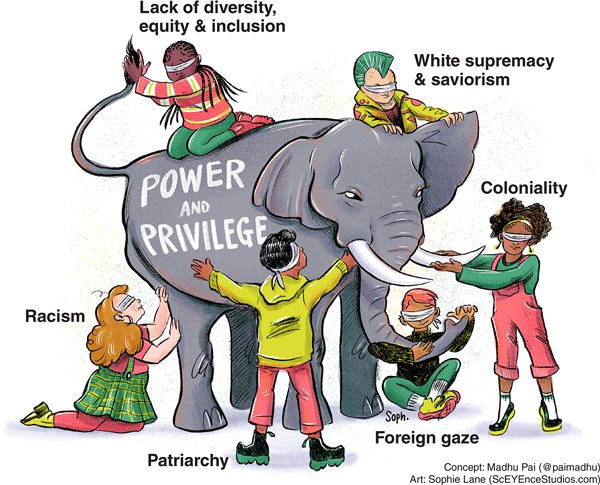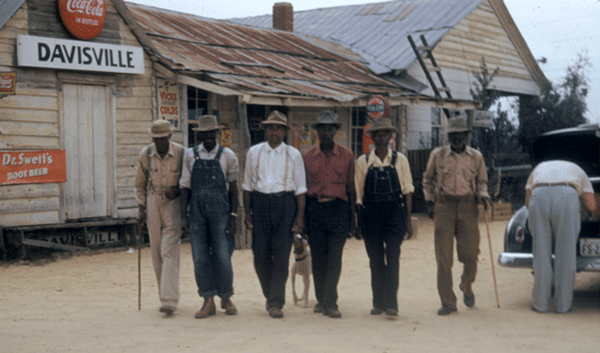Well, I found out that race runs deeply throughout all of medical practice. It shapes physicians’ diagnoses, measurements, treatments, prescriptions, even the very definition of diseases. And the more I found out, the more disturbed I became.
Dorothy Roberts
University of Pennsylvania
The negative impact of racial discrimination is related to systems of categorization, expressed through attitudes, prejudice, and discrimination as well as racialized practices and structures. Racial discrimination and ethnic bias may operate without a provider’s awareness, influencing a patient’s behavior in subtle ways and increasing racial or ethnic bias by reinforcing stereotypes (Ben et al., 2017).
Racial discrimination experienced within the healthcare setting can influence how a person perceives the healthcare system. It impacts patient satisfaction, levels of trust, perceived quality of interactions, and influences whether individuals follow provider recommendations (Ben et al., 2017).
8.1 Power, Privilege, and Oppression
Power, privilege, and oppression are rooted in historic systemic and structural inequalities strongly related to race, gender, class, and economic status. People with more power and privilege have access to better healthcare, while those who are less privileged tend to have limited access to care. Power asymmetries are rooted in a long history of unequal and unfair relationships, including colonialism, imperialism, post-World War II governance structures, and patriarchal norms and practices (Global Health 50/50, 2020).
The social structures that create disadvantages are the same ones that create advantages and benefits (Abimbola et al., 2021). People of color, those with disabilities, and individuals from lower socioeconomic backgrounds are more likely to be disadvantaged when seeking healthcare services.
Power, Privilege, and Oppression
Power: the ability to influence and control material, human, intellectual, and financial resources to achieve a desired outcome (Global Health 50/50, 2020).
Privilege: a set of often unearned, exclusive benefits given to people who belong to specific social groups (Global Health 50/50, 2020).
Oppression: a form of discrimination that leads to disparities.
8.2 Colonization and Colonial Medicine
Colonization is the process of assuming control of someone else’s territory and applying one’s own systems of law, government, and religion.
Stolen Lives: The Indigenous Peoples of Canada and the Indian Residential Schools / Historical Background
Colonization is a process of establishing occupation or control over foreign territories or peoples for the purpose of exploitation, trade, and settlement, including the subjugation of a people or area by the foreign power. Colonizers monopolize political power and often consider conquered societies and their people to be legally, socially, culturally, and biologically inferior.
Colonization has had a deadly impact on many cultures throughout the world. It has weakened or destroyed traditional food systems and restricted access to clean water. Suppression of cultural practices, loss of ancestral lands, and suppression of languages has had a devastating impact on many communities. Colonization replaced long held cultural practices with unsupported and underfunded systems, leading to extensive, systemic health disparities (Jensen and Lopez-Carmen, 2022).
Indigenous peoples in North America were subjected to rapid and widespread displacement, loss of homelands, and state-sanctioned murder. They were exposed to racist reproductive policies, limited access to reproductive health services, and environmental contamination (Yellow Horse et al., 2020).
With the theft of their ancestral lands, Indigenous peoples were forced onto reservations, where they have been exposed to pollution, pesticides, and lack of clean water. As a group, they are less wealthy, have less access to healthcare services, and experience food insecurity at levels greater than their white counterparts. For example, the Pine Ridge Sioux reservation, home of the Oglala Lakota Nation, has the lowest life expectancy in the U.S, and the second lowest in the entire western hemisphere (Jensen and Lopez-Carmen, 2022).

Global health has many asymmetries in power and privilege. Image source: Madhukar Pai, with artwork by Sophie Lane. Reprinted under the terms of the Creative Commons Attribution License.
8.3 The Impact of Slavery
Early travelers to the American West encountered unfree people nearly everywhere they went—on ranches and farmsteads, in mines and private homes, and even on the open market, bartered like any other tradeable good. Unlike on southern plantations, these men, women, and children weren’t primarily African American; most were Native American. Tens of thousands of Indigenous people labored in bondage across the western United States in the mid-19th century.
Kevin Waite
The Atlantic, November 25, 2021
Slavery has cast a long shadow over healthcare for many Americans. Enslaved people were often treated like livestock, overworked and easily replaced. Most received no medical care whatsoever or were subjected to medical experimentation without their consent. These practices have had long-lasting effects, resulting in ongoing disparities, and perpetuating the systemic racism that has plagued the healthcare system for centuries.
Medical ethicist Harriet A. Washington details some of the most egregious examples of unethical treatment of Black research subjects in her book “Medical Apartheid.” The now notorious Tuskegee syphilis experiment—Black male patients were led to believe they were receiving treatment for syphilis when, in fact, they were not. That study continued for 40 years, even after a cure for syphilis was developed in the 1940s (Jones, 2021).

Group of men who were test subjects in the Tuskegee Syphilis Experiments. Source: Wikimedia. Public domain.
Perhaps less widely known are the unethical and unjustified experiments J. Marion Sims performed on enslaved women in the U.S. in the 1800s that helped earn him the nickname the “father of modern gynecology.” Sims performed experimental vesicovaginal fistula surgery on enslaved women without anesthesia or even the basic standard of care typical for the time (Jones, 2021).
J. Marion Sims experimented on Anarcha, a 17-year-old slave, over 30 times. His decision not to give anesthesia was based on the racist assumption that Black people experience less pain than their white peers—a belief that persists among some medical professionals today (Jones, 2021).
